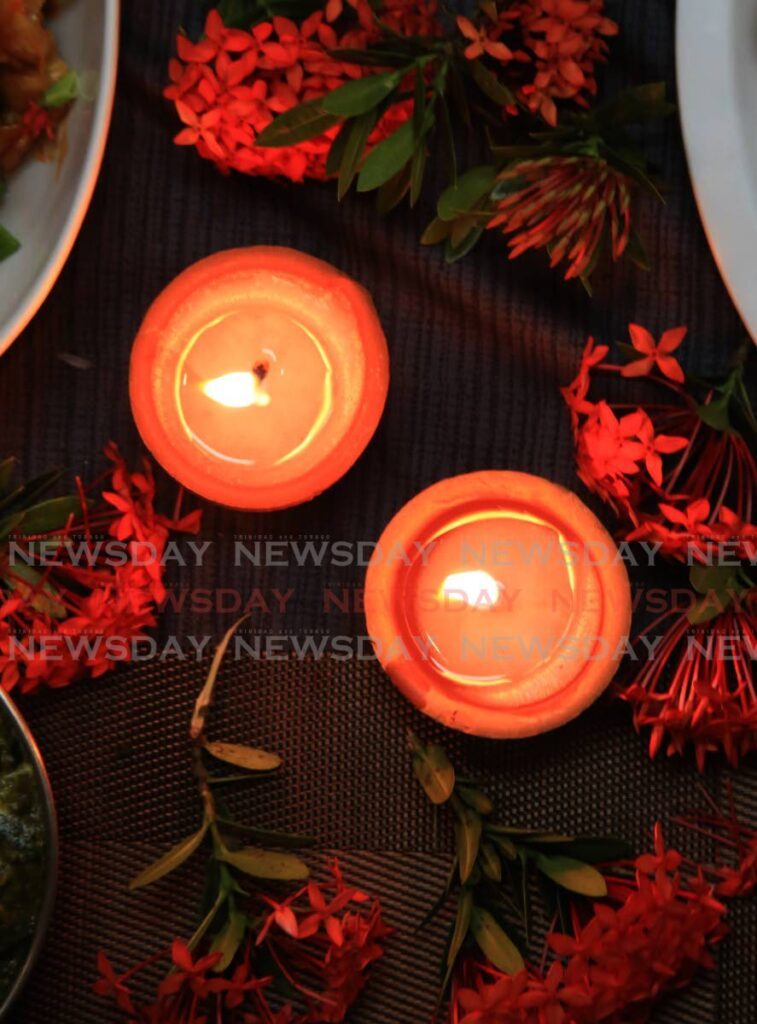The five-day celebration of Divali

BAVINA SOOKDEO
Divali, alternatively spelled as Diwali or Deepavali, holds profound significance as a major Hindu festival, signifying the victory of light over darkness and the triumph of good over evil. This year, the Divali festivities will take place on November 12.
While Divali may appear to many as a one-day celebration, in reality, it extends over five days, each with its distinct significance and rituals. The Divali festivities start with Dhanteras, followed by Kali Chaudhas, Divali, the Hindu New Year (when Goverdhan puja is performed), and Bhaiya Dooj.
Dhanteras, observed two days before Divali, derives its name from the fusion of
dhan, meaning money, and
teras, signifying 13. Falling on the 13th day of the Ashwin month, following the lunar calendar, this auspicious day typically falls in October or November. Dhanteras is marked by the acquisition of precious metals, believed to bring prosperity when bought on this day. These metals can range from household items to jewellery and are placed in the puja area, serving as a source of wealth and fortune throughout the year.
The second day of Divali, known as Kali Chaudas, is celebrated on the 14th day of the Ashwin month. This day pays homage to Mother Kali or Shakti, commemorating her victory over the malevolent Raktavija (a demon form the Hindi text). Kali Chaudas, also referred to as Narak-Chaturdashi, is a day dedicated to dispelling indolence and evil. The day also honours the legendary figure of Lord Hanuman. According to folklore, as a baby, Lord Hanuman mistook the sun for a fruit, leading to an inadvertent act that plunged the universe into darkness. Lord Indra intervened to restore the sun’s radiance. On Kali Chaudas, Hanuman puja is conducted, involving offerings of oil, flowers, chandan (sandalwood), sindoor, coconuts, and various sweets. Additionally, a ceremonial washing of the head and the application of
kajal (kohl) in the eyes are practiced to ward off the evil eye.

The subsequent day marks the pinnacle of Divali celebrations. This is when Lakshmi puja takes place, and sweets and meals are shared among family, friends, and those in need. The illumination of deeyas (oil lamps) and the bursting of firecrackers symbolise the victory of light over darkness and the triumph of knowledge over ignorance. On Divali, Mother Lakshmi is venerated in her eight distinct forms, each bestowing a unique blessing. Mother Lakshmi, revered as the goddess of wealth and prosperity, extends her benevolent protection not only over material riches but all forms of abundance. Often portrayed standing gracefully on a lotus, she is depicted with four arms, at times showering her devotees with golden coins.
This divine goddess’ eight forms are:
Dhana Lakshmi: The embodiment of monetary wealth.
Gaja Lakshmi: A harbinger of good luck, often depicted alongside an elephant.
Adhi Lakshmi: Bestowing blessings to fulfil desires and aspirations.
Aisvarya Lakshmi: Enhancing prosperity in all facets of life.
Vijaya Lakshmi: Enabling victory and triumph in endeavours.
Dhanya Lakshmi: The bestower of increased wealth.
Vira Lakshmi: A source of strength and courage to overcome adversaries and challenges.
Santhana Lakshmi: Granting the gift of children, symbolising fertility and parenthood.
After Divali, the Hindu New Year is joyfully welcomed. Goverdhan puja is also observed on this day, dedicated to the worship of mountains and trees. This act of worship is believed to enhance crop yields, safeguard against diseases, and promote harmony and happiness in the surroundings.
On the fifth and final day Bhaiya Dooj is celebrated, marking a significant occasion for brothers and sisters. Brothers are marked on their foreheads with
tilak (the equivalent of tikka – a dot in the centre of the forehead) by their sisters upon their arrival at the sister’s residence. After performing the necessary rituals, brothers partake in fruits or sweets to conclude their fast. This ritual is believed to enable brothers and sisters to attain salvation and ascend to heaven after their passing. Brothers reciprocate by presenting their sisters with jewellery or clothing, and sisters touch the feet of their brothers to seek blessings.
Divali is widely recognised as the grandest and most luminous of all Hindu celebrations. In TT, people from diverse backgrounds, both Hindus and non-Hindus, come together to celebrate this festival with great fervour. It is a time of joy, togetherness, and the triumph of light and goodness, as the entire community joins hands to celebrate this profound festival.


Comments
"The five-day celebration of Divali"